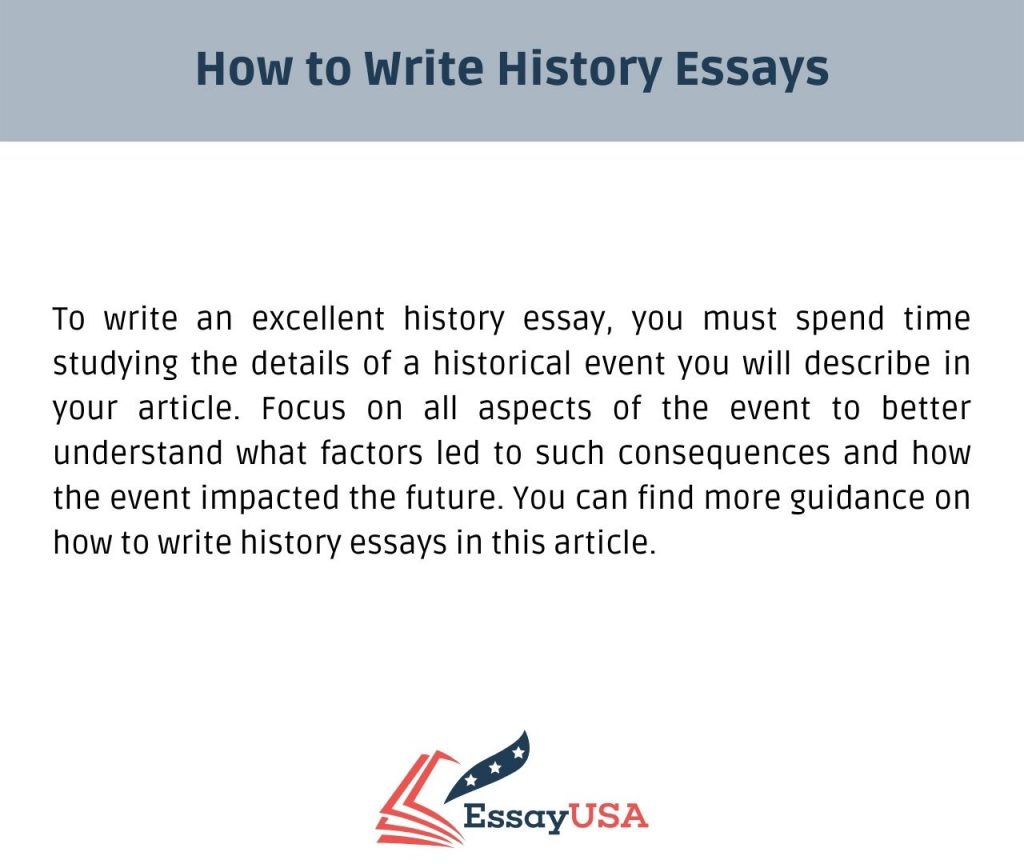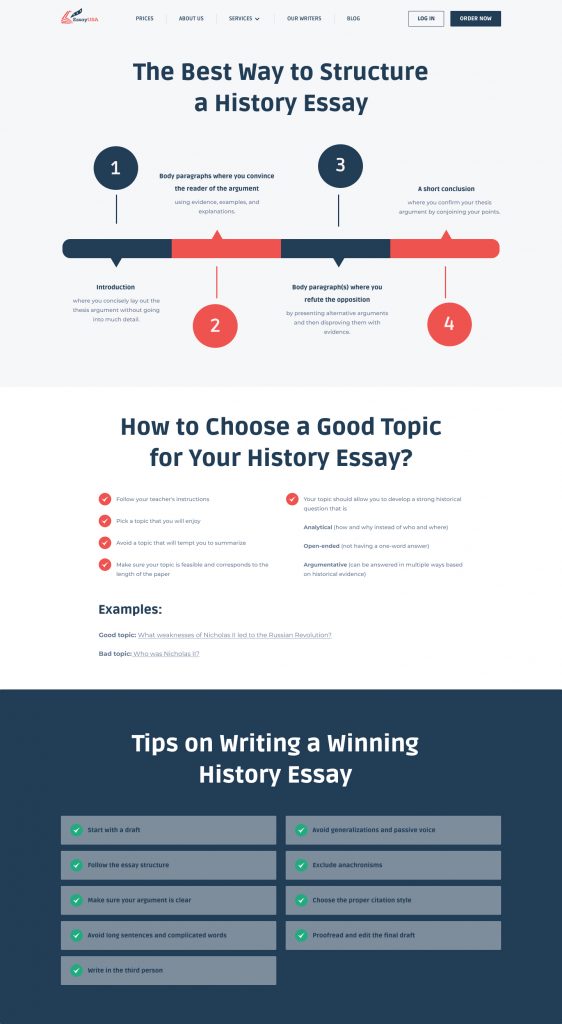
Intro
Essay writing is one of the most effortful student assignments. Not everybody can skillfully enunciate their views and ideas, especially when it comes to an essay that requires the presentation of arguments and counterarguments. Simultaneously, it is one of the best tools to improve your critical thinking and research skills.
A history essay is a particular type of creative work that requires brilliant research potential and the ability to analyze and track the consistent picture of historical events. To craft a successful history essay, students should go beyond the regular history classes and demonstrate their significant knowledge in political science, sociology, and even psychology.
If you were lucky to get a creative assignment in history, get ready to experience not the easiest time in your life. To make the overall process more efficient and straightforward, use this history essay writing guide for assistance.
What is a History Essay?
To elaborate an impeccable history paper, it is crucial to answer the ‘what is history essay’ question. The history essay’s essence lies in the successful introduction and confirmation of statements related to some historical events or personalities. To make your work sound professional, you need to:
- elucidate the factors that have led to such consequences;
- build a logical bridge between the past and the present by describing the importance of the phenomenon you are dealing with.
A top-notch history paper never focuses on the past mainly. It rather comes up with the impact the past events have on the present. An ability to fully reveal the given influence is the most significant proof that the author has a good understanding of the topic and can easily share their perspective professionally and to the point.
Having the instructions and practical tips on how to write a history essay is the first key to a successful paper. Many students just start rewriting the historical events in their own words at this stage. Instead, your essay should provide clear answers to three central questions: what, why, and how. These questions may become good starting points for your history essay and help you stay coherent.
Before You Start: Preparing to Write

Having three questions in mind when preparing to write a history essay is already half a work done. Carry out a little brainstorm session and formulate several sub-questions using the mentioned interrogative adverbs. They will contribute much to the creation of an effective structure in your history essay. Here’s a breakdown of the main questions addressed.
Who
- Who are the main characters of the given events?
- Who is against the given events?
- Who won from the given events? Who lost?
- Who is currently in the winning position thanks to the mentioned events?
What
- What circumstances caused the given events?
- What changes did the given events cause?
- What kind of effect did the events have on the present?
- What conclusions have been made after these events?
Why
- Why did the given events take place?
- Why were they supported/not supported by people?
You may also come up with your suggestions regarding the specific topic to make your essay even more professional.
Nonetheless, it is not enough only to write down the questions. You have to analyze and evaluate them profoundly. You may be very accurate about the described shreds of evidence, proofs, and arguments. However, if your essay doesn’t provide precise answers to the fundamental questions, it is unlikely to be highly scored. To stay coherent and to the point, use an explanation/interpretation scheme that implies the reasons why something has happened, followed by the profound analysis of the events.
When the above-mentioned work is done and questions have been answered, you are ready to form your paper’s thesis statement. If we talk about the history essay, its thesis statement should be strong enough to prove the significance and value of your work. Besides, convincing arguments help create a solid bone to structure your essay around.
Your paper’s thesis statement should accurately elucidate the essay’s essence and be supported with the concise arguments that would become its paragraphs. All you need to do is specify them and then elaborate in more detail.
You can change the arguments throughout the essay, but the thesis statement should remain the same and be rational enough to stay relevant till the end.
Research Stage
Nominally, the sources you will be using for your history essay can be divided into primary and secondary ones. Primary sources refer directly to the description of the events or personalities you base your paper on. Secondary sources represent the works of experienced historians, sociologists, and politicians that contain the profound analysis of the events described within your topic.
The professional history essay cannot exist without trustful primary sources. It can be challenging to find and identify them. Fortunately, the XXIst century provides a decent range of opportunities to complete thorough research work. You can have access to the best scholars’ papers, databases of the world libraries, and blogs of famous experts. Crowd-sourced websites can also be of good service. However, they should be used very selectively after you make sure they are credible.
Secondary sources are as important as the primary ones. You need to be sure of their credibility and choose exclusively scholarly works. Check whether the author of the paper you are going to use in your essay is a professional historian and can be trusted. To make the right choice, ask yourself several questions before referring to any source:
- What do you know about the author?
- Does the author have an academic degree and enough experience to be trusted?
- What can you say about the publishing house? Is it academic? If it is a website, check its nature and audience. The idea to use materials published on Government online platforms in your paper sounds just perfect.
History Essay Outline

Coming to the outline stage means that you have done all the preparatory work and are ready to move forward. The outline is frequently skipped by students, which makes them regret it later. The outline is a so-called roadmap to indicate the direction you need to move in and mark the proper placing of arguments and ideas.
Like all other types of essays, a history paper consists of an introduction, body paragraphs, and conclusion.
Introduction
Are you wondering how to start a history essay? With the catching introduction, of course. Introduction to your history essay should serve as a so-called hook to immediately grab the readers’ attention. To make it as catching as possible, you may use a few simple yet trusting methods:
- Include some facts or impressive statistics. This will help easily win people’s trust and make your paper more relevant;
- Rhetorical questions always help define the sense of your creative work. Use them in the introduction to indicate the main points your work will be based on;
- Quotations may also be of good service in case you want to make people intrigued.
Provided the hook has worked, don’t hesitate to introduce your paper’s theme: mention the key events or persons your essay is about. Usually, a good introduction ends with a strong thesis statement. Make it short and up to the point. Besides, make sure it provides a smooth transition to the body section of your history essay.
Essay Body
Divide your critical ideas described in the essay and between the paragraphs: one paragraph = one idea. Each idea needs to be supported by concise arguments. There is no standard scheme to build your body paragraphs on. However, you may take the following algorithm for the basis:
- A sentence related to the thesis statement and elucidating the idea;
- Context of your history essay;
- Facts in the form of quotation or rewritten
- Analysis and your point of view
- Facts in the form of quotation or rewritten
- Analysis and your point of view
- Description of the controversial points
- Smooth transition to the next paragraph
It is highly recommended to place the arguments of your body section in correct order. Start with the weakest ones and leave the strongest ones for a dessert.
Conclusion
You should put your best effort into making this paragraph as impressive and convincing as possible. The final part of your paper should focus on the main points of the essay and again prove the theory mentioned in the thesis statement. Don’t make the conclusion too complicated – it needs to be simple and straightforward. The conclusion is not a part of the paper where you may introduce some new facts and ideas. Its main goal is in summarizing the critical points previously specified in the essay. If you want to make a conclusion sound professional, don’t forget to mention the historical events’ relevance to today’s reality.
How to Choose a Topic for a History Essay?
In case you were lucky to choose the topic for your history essay by yourself, don’t skip this part. Selecting from a pile of history essay topics may be challenging as you need to know your educational level, interests, and ability to elaborate on the theme. An adequately chosen history essay topic is a basis for a good paper. It affects the overall writing process and the level of your engagement in the subject. Use these tips to choose the best topic for your history paper:
- Focus on the theme that sounds interesting to you. If history is not your cup of tea, try to pick the theme that seems more interesting than others. History is tightly connected with all aspects of human life. So, there should be something that makes your heart beat faster.
- Don’t be guided by interest only when choosing a topic for the history essay. You should know at least something about the given theme. Even the most exciting issues can turn out to be a nightmare to deal with if you know absolutely nothing about them.
- Analyze the broadness of the topic. If it is too broad, you won’t be able to elaborate the theme decently. For example, the topic “Ancient Egypt” is unclear. You won’t be able to elucidate all its aspects and perspectives properly. However, dealing with “Attitudes Towards Women in Ancient Egypt” narrows your research scope and lets you stay clear and precise.
- Make sure the topic you are going to choose has been analyzed before, and you can find a lot of credible materials to base your research on. Even narrow themes can be challenging if they are unexplored.
- If you have a chance to use the theme you have already been dealing with before, don’t hesitate to do it. There is no need to rewrite your old paper – you have an excellent opportunity to analyze things from another perspective. Reusing the topic is hugely advantageous, as you have all the research work done already and may concentrate on your personal opinion.
- In case sitting on the fence while choosing the topic for your history essay becomes unbearable, you can always ask your tutor for a piece of advice. In such a way, you will demonstrate your respect and trust.
- Avoid offbeat themes. They may be interesting, however, totally new. If you are not afraid of being stuck at the research stage – go ahead!
- Make a little brainstorm session before choosing any topic. Provided you can come up with at least five strong arguments related to the theme, don’t hesitate to pick it.
History Essay Examples
Nothing can be more helpful than a brilliant history essay example you can use for your future work. You may take a look at the essay’s purpose, analyze the structure, get an idea about transitions and vocabulary used. Check on these top-notch examples of history paper to get inspired and motivated:
https://www.slideshare.net/alipinedo/us-history-slavery-essay
https://studentshare.org/visual-arts-film-studies/1494729-art-history-paper
Writing Tips for a History Essay
Interpretation of the past may be pretty controversial. So are the rules on how to write a perfect history essay. Nevertheless, there are some standard conventions and guidelines for elaborating professional history papers without any special effort from your side. Just follow the below tips to get the highest grade under the toughest history essay rubric.
Use the past tense
The present tense is just inappropriate when dealing with the history essay. Moreover, it can undermine confidence in the qualifications and expertise of the author. The present tense is acceptable only when you draw parallels between past events and the current time.
Avoid generalizations
Specificity and accuracy are the best friends of a highly professional history essay. If you talk about some specific period, introduce exact dates or centuries. In case you mention some personalities, provide their full names. History paper is senseless without these critical details.
Exclude anachronisms
When dealing with some historical events from today’s perspective, it is easy to get lost in chronological order. Such a jumble can confuse the readers and make your work less credible. Mind the vocabulary you use when talking about a specific epoch.
Try not to judge the epoch from a modern perspective
Every generation has its advantages and drawbacks. Your main task as an author is to analyze both and convey them clearly to a reader. Don’t be judgmental.
Paraphrasing is always better than quoting
Stuffing your history essay with the quotes can be more of a hindrance than help. Don’t be afraid to showcase your analytical skills and dive deep into the profound analysis of past events. If paraphrasing is impossible, use the quote indicating its source.
Be responsible for the context
As an author, you assume full responsibility for your personal opinion and ideas. At the same time, you should be sure of the sources you use in your paper. History essays don’t stand uncertainty and double standards.
Choose the proper citation style
As a rule, history papers require Chicago citation style. A poorly arranged citation page can question your reputation as a history expert.
Stick to the proper voice
A formal academic voice is the most appropriate one when we talk about the history essay. Also, avoid passive voice phrases, redundant constructions, and generalizations.
Take care of thorough proofreading
You have made it: your history essay is ready and waits to be polished. The editing stage is crucial as even the brightest ideas can get lost in a sea of mistakes, impurities, and vague phrases. How to proofread your history essay to make it shine? Check the below instructions to learn how to do it:
- Read your history essay aloud several times to make sure it is clear and sounds smooth. Avoid long sentences and inaccurate phrases with unclear meaning.
- Proper style is important when we talk about the academic history essay. Make sure it is formal but readable. Readers should easily percept your message and clearly understand the goal of your research.
- Proofreading may be challenging in case you have spent a lot of time elaborating on the content. If you can ask someone to look at your history paper with a fresh pair of eyes, it would be perfect. Independent readers can identify the weak places in your work faster, and you will get a valuable second opinion on your piece of writing.
Write My History Essay for Me, Please!
History paper is one of the most complicated types of writing. Students dealing with history topics should know more than just a material of a regular history syllabus. Moreover, this paper requires a lot of time and effort to do research, analyze, and establish logical connections and predictions. You have to deal with the vast amount of dates, personalities, and theories that may not always be true. No wonder a lot of students choose to ask someone to write their history assignment for them. This decision appears to be justified as our essay writing service offers help provided by the actual history scholars who, by the way, are excellent in writing.
All you need to do is formulate the task specifying the detailed instructions to your assignment and indicate the deadline. In case you want some specific sources to be used when elaborating on your history paper, you should mention them in your reference list.
In case your history essay is ready and you just need to make it shine, our essay service is always ready to help you with editing and proofreading. In such a way, you pay only for a specific service, not for the whole writing package.
A brilliantly elaborated history essay can serve as a good base for all your future works. You may get a clear idea about the content, research process, vocabulary, structure, and citation style. Just place the order, and our highly professional expert will be there to help you with your history paper.

